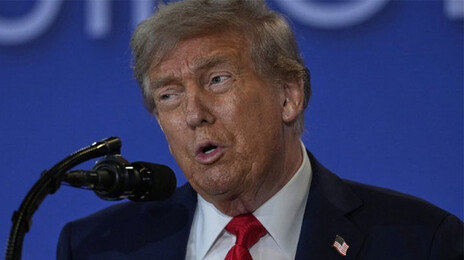공유하기
미국의 한반도 전문가 설문조사 분석결과(원문)
-
입력 2002년 4월 5일 21시 28분
글자크기 설정
___ A. Fully approve(9, 12.5%)
___ B. Somewhat approve(8, 11.1%)
___ C. Neither approve nor disapprove(3, 4.2%)
___ D. Somewhat disapprove(22, 30.5%)
___ E. Completely disapprove(30, 41.7%)
2. Do you agree or disagree with President Bush’s designation of North Korea as part of an “axis of evil?”(69)
___ A. Completely agree(10, 13.9%)
___ B. Somewhat agree(5, 6.9%)
___ C. Neither agree nor disagree(5, 6.9%)
___ D. Somewhat disagree(16, 22.2%)
___ E. Completely disagree(33, 45.8%)
3. If you answered A or B in Question 2, why do you agree with President Bush’s designation?(15)
___ A. President Bush has correctly identified the nature of the North Korean regime.(8, 53.3%)
___ B. Placing such pressure on North Korea can force it to come to the table for talks with(2, 13.3%)
___ C. South Korea and the United States.
___ D. President Bush needed to have the Kim Dae-jung Administration clearly understand U.S. policy toward North Korea.(0, 0%)
___ D. All of the above.(5, 33.3%)
___ F. None of the above.
4. If you answered D or E in Question 2, why do you disagree with President Bush’s designation?(48)
___ A. North Korea’s situation is different from that of Iran and Iraq.(4, 8.1%)
___ B. Such a hard-line posture will lead North Korea to close the door on talks with South Korea and the U.S.(5, 10.2%)
___ C. The remarks undermine the consensus with South Korea on how to deal with North Korea.(5, 10.2%)
___ D. All of the above.(34, 69.4%)
5. Do you support or oppose President Kim’s Sunshine Policy?(72)
___ A. Strongly support(27, 37.5%)
___ B. Somewhat support(35, 48.6%)
___ C. Neither support nor oppose(7, 9.7%)
___ D. Somewhat oppose(3, 4.2%)
___ E. Strongly oppose(0, 0%)
6. If you answered A or B in Question 5, why do you support the Sunshine Policy?(60)
___ A. The policy has contributed to North-South reconciliation and promoted exchanges between the two Koreas.(8, 12.9%)
___ B. The policy has helped build confidence between the two Koreas.(4, 6.5%)
___ C. In long run, Sunshine Policy is the most cost-effective approach with the least amount of risk.(16, 25.8%)
___ D. All of the above.(32, 51.6%)
7. If you answered D or E in Question 5, why do you oppose the Sunshine Policy?(1)
___ A. The policy allows North Korea to unilaterally set the tone of North-South relations.(0, 0%)
___ B. The policy has led North Korea to develop unreasonable expectations.(0, 0%)
___ C. The policy has failed to produce a consensus on how to deal with North Korea.(0, 0%)
___ D. President Kim has only used the Sunshine Policy for domestic political purposes.(0, 0%)
___ E. All of the above.(1, 33.3%)
8. The South Korean government is now subsidizing Hyundai’s Kumgang-san tours due to the venture’s chronic financial difficulties. Do you approve or disapprove of the government’s involvement?(71)
___ A. I approve of the government’s involvement.(28, 38.9%)
___ B. I disapprove of the government’s involvement.(43, 59.7%)
9. If you answered A in question 8, why do you support the government’s involvement?(28)
___ A. The tours are necessary not only to maintain the Sunshine Policy but also to promote exchanges between the two Koreas.(5, 17.9%)
___ B. Maintaining programs like the Kumgang-san tours will ultimately be helpful for the unification of the two Koreas.(9, 32.1%)
___ C. The tours give South Koreans a better understanding of the North.(1, 3.6%)
___ D. All of the above.(13, 46.4%)
10. If you answered B in question 8, why do you oppose the government’s involvement?(38)
___ A. Giving cash to North Korea will only help it to increase its military capabilities.(2, 4.6%)
___ B. The tours do not contribute for exchanges between the two Koreas.(11, 25.6%)
___ C. North Korea will halt the tours when there is a change of government in South Korea.(0, 0%)
___ D. The tours are economically unviable.(12, 27.9%)
___ E. All of the above.(13, 30.2%)
11. What stance should South Korea’s next administration take toward North Korea?(70)
___ A. Continue the Sunshine Policy.(7, 9.7%)
___ B. Make some adjustments while maintaining the basic principle of engagement.(47, 65.3%)
___ C. Pursue a new approach toward North Korea based on reciprocity.(15, 20.8%)
___ D. Cease all efforts to engage North Korea(1, 1.4%)
12. What is your assessment of the Geneva Agreed Framework?(66)
___ A. The U.S. should abide by the framework.(50, 69.4%)
___ B. The U.S. should renegotiate the framework because the situation has changed since 1994.(16, 22.2%)
___ C. The U.S. should abandon the framework and pursue a comprehensive agreement.(0, 0%)
___ D. The U.S. should abandon the framework and not try to reach a new agreement.(0, 0%)
13. What should be the top priority for improving relations between North Korea and the U.S.?(rank from 1 to 4 with 1 being the top priority)(65)
___ A. The Bush Administration should abandon its hardline approach toward North Korea.(18, 25.0%)
___ B. The Bush Administration should remove North Korea from the list of the countries supporting terrorism.(13, 18.1%)
___ C. North Korea must give up the development and export of weapons of mass destruction.(10, 13.9%)
___ D. North Korea should return to the negotiating table without any preconditions.(24, 33.3%)
14. What is your assessment of the economic reforms taken by the Kim Administration since the Asian Economic Crisis of 1997?(70)
___ A. South Korea has made great progress in reforming its economy.(9, 12.5%)
___ B. There has been some reform, but much more needs to be done.(56, 77.8%)
___ C. There have not been any significant changes.(4, 5.5%)
___ D. The economic situation has actually gotten worse than it was in 1997.(1, 1.4%)
15. Looking back at the Kim Administration’s economic policies, what do you think has been its greatest accomplishment?(56)
___ A. Macroeconomic stabilization(40, 55.5%)
___ B. Foreign Direct Investment policy(9, 12.5%)
___ C. Corporate reform(3, 4.2%)
___ D. Financial reform(2, 2.8%)
___ E. Labor reform(1, 1.4%)
___ F. Public sector reform(1, 1.4%)
16. What has been the Administration’s greatest economic policy failure?(56)
___ A. Macroeconomic stabilization(1, 1.4%)
___ B. Foreign Direct Investment policy(2, 2.8%)
___ C. Corporate reform(8, 11.1%)
___ D. Financial reform(5, 6.9%)
___ E. Labor reform(12, 16.7%)
___ F. Public sector reform(19, 26.4%)
17. A number of foreign direct investment proposals by American firms have either fallen through or been slow to materialize. How would you rank (from 1 to 5) the following factors, with 1 being the most important?(59)
___ A. Lack of transparency(21, 29.2%)
___ B. Labor issues(9, 12.5%)
___ C. Government red tape(4, 5.5%)
___ D. Debt relief(1, 1.4%)
___ E. Asset valuation disagreements(24, 33.3%)
18. What do you think President Kim should focus on during his remaining time in office?(67)
A. North-South relations.(8, 11.1%)
B. The South Korean economy.(28, 38.9%)
C. Diplomatic issues, particularly relations with the U.S. and Japan.(3, 4.2%)
D. Impartially managing the local and presidential elections.(23, 31.9%)
E. Successfully hosting the World Cup and Asian Games.(5, 7.0%)
19. Koreans will elect their next president in December. How would rank (from 1 to 4) the salience of the following issues, with 1 being most salient?(65)
___ A. North-South relations(3, 4.2%)
___ B. The economy(24, 33.3%)
___ C. Personality politics(24, 33.3%)
___ D. Regionalism(14, 19.4%)
20. Are you concerned about the potential rise of anti-Americanism in South Korea?(70)
___Yes(49, 68.0%)
___No(21, 29.2%)
21. If your answer to the previous question was yes, what are the causes of anti-Americanism? (rank from 1 to 5, with 1 being most serious)(42)
___ A. The Bush Administration’s hardline stance toward North Korea.(16, 32.6%)
___ B. U.S. trade pressure and protectionist measures.(10, 20.4%)
___ C. The 2002 Winter Olympics Short Track controversy involving South Korean and U.S. skaters.(2, 4.1%)
___ D. The location of U.S. military bases.(10, 20.4%)
___ E. Incidents involving the U.S. military or individual U.S. soldiers.(4, 8.2%)
22. What should be the top priority for improving relations between South Korea and the U.S.? (rank from 1 to 4, with 1 being the top priority)(63)
___ A. Americans need to better understand the situation on the Korean Peninsula.(30, 41.7%)
___ B. Koreans need to better understand President Bush’s policy toward North Korea and how much the U.S. has changed since September 11.(6, 8.3%)
___ C. The leaders of both countries need to exchange views more frequently and intensively.(19, 26.4%)
___ D. Koreans should try to be less nationalistic and emotional.(8, 11.1%)
워싱턴=한기흥특파원기자 eligius@donga.com
트렌드뉴스
-
1
1만명 뒤엉킨 日 ‘알몸 축제’ 사고 속출…3명 의식불명
-
2
국힘 공관위 출발부터 삐걱…‘李 변호인 이력’ 황수림 자진사퇴
-
3
119 구급차 출동 36%가 ‘허탕’… “심정지 대응 10분씩 늦어져”
-
4
조희대 “與, 사법제도 틀 근본적으로 바꿔…국민에 직접 피해”
-
5
‘현지 누나’ 문자 파문 김남국, 민주당 대변인에 임명
-
6
李 “룰라, 내 인생 역정과 너무 닮아…영원한 동지 환영”
-
7
[천광암 칼럼]장동혁은 대체 왜 이럴까
-
8
연금 개시 가능해지면 ‘가능한 적은 금액’ 즉시 인출하세요
-
9
“수도관 좀 고쳐요”…52억원 금괴 기부한 익명의 일본인
-
10
구성환 반려견 ‘꽃분이’ 무지개다리 건넜다…“언젠가 꼭 다시 만나”
-
1
[천광암 칼럼]장동혁은 대체 왜 이럴까
-
2
119 구급차 출동 36%가 ‘허탕’… “심정지 대응 10분씩 늦어져”
-
3
韓 ‘프리덤 실드’ 축소 제안에 美 난색…DMZ 이어 한미동맹 갈등 노출
-
4
“장동혁 사퇴” “분열 행위”…‘尹 절연’ 거부에 원외당협 정면 충돌
-
5
야상 입은 이정현, ‘계엄 연상’ 지적에 “뻥도 그정도면 병”
-
6
‘현지 누나’ 문자 파문 김남국, 민주당 대변인에 임명
-
7
李 “다주택자 압박하면 전월세 불안? 기적의 논리”
-
8
러시아 “韓, ‘우크라 무기 지원’ 동참하면 보복하겠다”
-
9
급매 나오는 강남, 현금부자 ‘줍줍’…대출 막힌 강북은 버티기
-
10
조희대 “與, 사법제도 틀 근본적으로 바꿔…국민에 직접 피해”
트렌드뉴스
-
1
1만명 뒤엉킨 日 ‘알몸 축제’ 사고 속출…3명 의식불명
-
2
국힘 공관위 출발부터 삐걱…‘李 변호인 이력’ 황수림 자진사퇴
-
3
119 구급차 출동 36%가 ‘허탕’… “심정지 대응 10분씩 늦어져”
-
4
조희대 “與, 사법제도 틀 근본적으로 바꿔…국민에 직접 피해”
-
5
‘현지 누나’ 문자 파문 김남국, 민주당 대변인에 임명
-
6
李 “룰라, 내 인생 역정과 너무 닮아…영원한 동지 환영”
-
7
[천광암 칼럼]장동혁은 대체 왜 이럴까
-
8
연금 개시 가능해지면 ‘가능한 적은 금액’ 즉시 인출하세요
-
9
“수도관 좀 고쳐요”…52억원 금괴 기부한 익명의 일본인
-
10
구성환 반려견 ‘꽃분이’ 무지개다리 건넜다…“언젠가 꼭 다시 만나”
-
1
[천광암 칼럼]장동혁은 대체 왜 이럴까
-
2
119 구급차 출동 36%가 ‘허탕’… “심정지 대응 10분씩 늦어져”
-
3
韓 ‘프리덤 실드’ 축소 제안에 美 난색…DMZ 이어 한미동맹 갈등 노출
-
4
“장동혁 사퇴” “분열 행위”…‘尹 절연’ 거부에 원외당협 정면 충돌
-
5
야상 입은 이정현, ‘계엄 연상’ 지적에 “뻥도 그정도면 병”
-
6
‘현지 누나’ 문자 파문 김남국, 민주당 대변인에 임명
-
7
李 “다주택자 압박하면 전월세 불안? 기적의 논리”
-
8
러시아 “韓, ‘우크라 무기 지원’ 동참하면 보복하겠다”
-
9
급매 나오는 강남, 현금부자 ‘줍줍’…대출 막힌 강북은 버티기
-
10
조희대 “與, 사법제도 틀 근본적으로 바꿔…국민에 직접 피해”
-
- 좋아요
- 0개
-
- 슬퍼요
- 0개
-
- 화나요
- 0개


